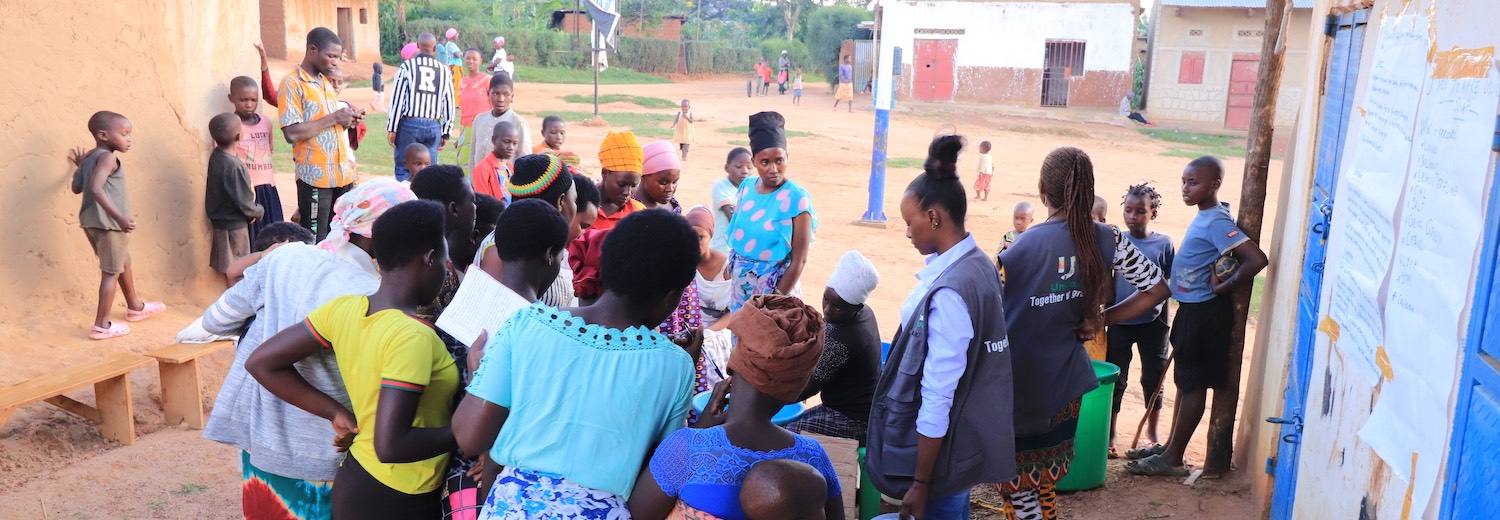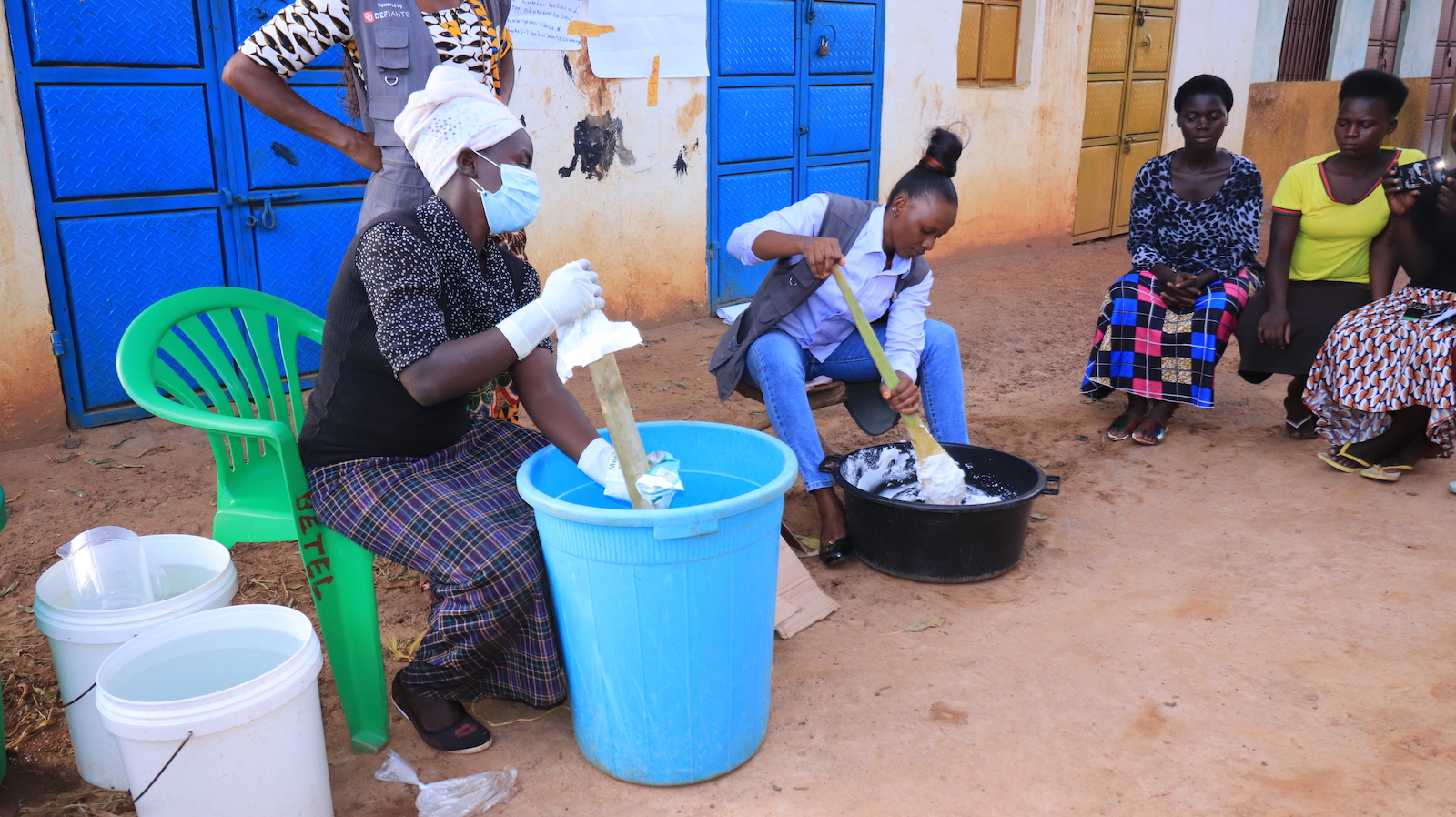Self-Relience Fuels the Uptake of Soap Manufacturing Courses within Nakivale
According to statistics, women make up over 50% of the refugee population in Africa. Yet, despite their numbers, they are deemed to be amongst the most vulnerable in society. It is little wonder then, that with their displacement from their homes, the women now living at the Nakivale Refugee Settlement in Uganda, have little in the way of prospects for the future. Many of the refugees, men included, face major barriers to inclusion within local economies, which makes finding stability and earning a living almost impossible.
Many factors in recent years have further impacted women’s development in Uganda, and especially in the Nakivale refugee settlement. COVID-19 was detrimental to the financial opportunities of women, in particular. However, there are many barriers which prevent their inclusion. They are also known to suffer more regularly from gender discrimination, which often closes the door to opportunities otherwise offered to women in other parts of the world. This leads to much lower pay, and is having an impact on the amount of food available to families, as well as the opportunity for the education of children.
Many of the female refugees who have come to Nakivale, left their homes for a number of reasons. Being subject to domestic violence and child marriage resulting in childhood pregnances are dominant aspects in their displacement. However, the team at Unidos has already set out on a journey to stop abuse in its tracks, providing training to help women and girls become educated, and helping them to start and grow their own businesses is just the first step to empowerment.
According to World Vision, women’s empowerment can be defined as “promoting women’s sense of self-worth, their ability to determine their own choices, and their right to influence social change for themselves and others. It is closely aligned with female empowerment – a fundamental human right that’s also key to achieving a more peaceful, prosperous world.”
The UNHCR have identified women’s empowerment as one of the major catalysts in the health, education and wellbeing of a family, and here at Nakivale, the team seek to provide that stability for the female members of the community. Stability is exactly what the team here are hoping to inspire as more women take part in education in Soap Manufacturing – a course to help women learn new skills in soap production and business management.
Nakivale is home to over 150,000 people, the number of which is growing as more refugees join and communities grow. Found in the Isingiro region of Uganda, it is home to refugees from 8 African countries; the Democratic Republic of Congo, Somalia, Burundi, Rwanda, Ethiopia, South Sudan, and Eritrea.
What is Involved?
The women of Nakivale join the course, which is taught by one female member of the community. She starts by explaining the different ingredients that are needed to make soaps, as well as the quantities and how to mix those ingredients together correctly, as well as teaching the women exactly what role each ingredient has and why it is needed. Once the soaps are made, trainees take the soaps home to test them. The second part of the course is centered around building relationships for the women within the community. Placed into groups, the women learn how to work together and build relationships with other women. Here they often talk about their shared experiences and they get to grow their own communities by fostering the relationships that they make within the course.
Unidos provide all of the materials to help get them started, but once they begin to earn a profit, they are asked to return the training materials provided so that other women may learn new skills, too. Almost all of the ingredients are sourced from the city of Kampala, but the women also develop Medical soap, for which we use local ingredients.
With their newly acquired skills and with new relationships formed, the women of Nakivale are then able to go out into the community to start their own businesses. They acquire more materials to make the soap and also tools to help brand their own business, making it uniquely theirs.

Has the Course Been Successful?
We try to bring 20 women onto a course at any time, to ensure as many as possible have the chance to learn new skills. With almost 500 women having undertaken this course, the future is looking bright for families all over the settlement.
“There is such a strong interest in women being self-reliant and contributing to their families as men always do in the community,” says Paulinho Muzaliwa, Founder of Unidos. “There has been significant demand for soaps here. We have a particular trainer from Unidos, but we also have volunteers who have been trained before and who want to facilitate other new learners in the soap-making process.”
Why is Empowering Women Important?
Paulinho goes on to say that “Training women in various entrepreneurial skills (such as soap-making) enables them to respond to their personal and family needs, thereby making it a priority for us to organise more frequent sessions aimed at expanding their personal growth.”
Unlike the food aid that is currently brought to Nakivale by the World Food Programme (WFP), manufacturing soap teaches the women how to generate their own money and how to be self-reliant. Strong relationships are built with other women, too, which helps them to empower and challenge each other. The course also plays host to special one-off events where the women have the freedom to express themselves and their creativity. This builds strong ties within the community and allows the women to forge their own future.
There are many success stories of women who are now able to pay school fees, or afford food for their children through making soap and selling it, and because of this success, the women are helping to teach these skills to others in the community. This sharing economy is growing rapidly, empowering so many of the residents here, at Nakivale.
“When it comes to creating a future that we want, none should be left behind. We need everyone’s uniqueness, wisdom, and experience to reach our vision, thus empowering these women is another great cause that will enable us to reach where we want to be and be the change we want to see,” says Paulinho. He goes on to say, “If we can scale our impact positively within the local economy of Nakivale and create more job opportunities for many women, we will be able to offer a higher market opportunity, expanding their earning potential.”
In some communities, there is a belief that women exist only to give birth, or to cook, or to take care of the home. However, from the impact we have seen from delivering training in soap manufacturing, women have the potential to shape the entire community, and empower and shape the course of their future, just with simple soap-making and business skills. These enable a woman to be independent of her husband, having a direct influence on the health, wellbeing, and education of her family. So, women’s empowerment is crucial here at Nakivale. By empowering women to start their own enterprises, we fortify our community and the future of families and, in particular, the future of the next generation.
What is the Future of Soap Manufacturing at Nakivale?
Throughout the success of this course, Unidos have seen an increase in job opportunities, as well as quality products being offered and used by the community. Many women are now self-sustaining – a key indicator that the course is having the outcome that the community deserves. In the future, it is hoped that we see women taking the lead in this new generation to help uplift the local economy, be self-reliant, and become role models who inspire the next generation, turning this difficult situation they are passing through into success stories.
Finally, Paulinho Muzaliwa says, “Educating a woman is a key starting point of a new prosperous community. It is important for me, because once educated and committed to a cause, a woman becomes unstoppable until she reaches her goal. It is important for women in this community, because they are always doing everything for the entire community – to make it a better place for their children. This is the future we want to build on. This is the Nakilvale we wish to grow.”
We understand that by investing in economic opportunities for female refugees, we stand a chance to help close gaps in poverty, gender equality, and inclusive work – all while helping strengthen economies on a local and global scale.

